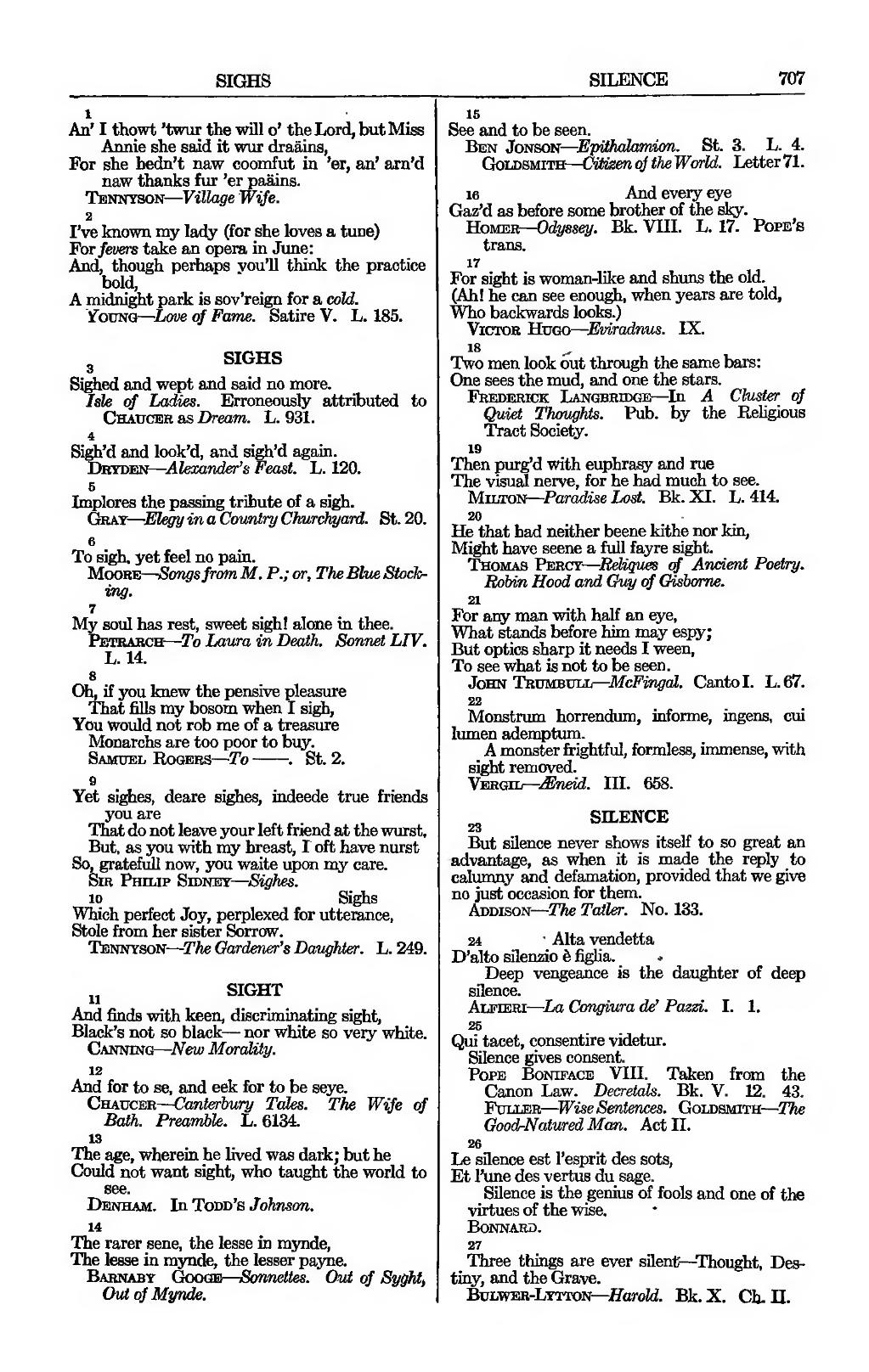An' I thowt 'twur the will o' the Lord, but Miss Annie she said it wur draāins,
For she hedn't naw coomfut in 'er, an' arn'd naw thanks fur 'er paäins.
I've known my lady (for she loves a tune)
For fevers take an opera in June:
And, though perhaps vou'll think the practice bold,
A midnight park is sov'reign for a cold.
SIGHS
Sighed and wept and said no more.
Sigh'd and look'd, and sigh'd again.
| author = Dryden
| work = Alexander's Feast.
| place = L. 120.
| note =
| topic =
| page = 707
}}
{{Hoyt quote
| num =
| text = Implores the passing tribute of a sigh.
| author = Gray
| work = Elegy in a Country Churchyard.
| place = St. 20.
| note =
| topic =
| page = 707
}}
{{Hoyt quote
| num =
| text = To sigh, yet feel no pain.
| author = Moore
| work = Songs from M. P.; or, The Blue Stocking.
| place =
| note =
| topic =
| page = 707
}}
{{Hoyt quote
| num =
| text = <poem>My soul has rest, sweet sigh! alone in thee.
Petrarch—To Laura in Death. Sonnet LIV.
L. 14.
| author =
| work =
| place =
| note =
| topic =
| page = 707
}}
{{Hoyt quote
| num = 5
| text = Oh, if you knew the pensive pleasure
That fills my bosom when I sigh,
You would not rob me of a treasure
Monarchs are too poor to buy.
Samuel Rogers—To . St. 2.
Yet sighes, deare sighes, indeede true friends
you are
That do not leave your left friend at the wurst,
But, as you with my breast, loft have nurst
So, gratefull now, you waite upon my care.
Sir Philip Sidney—Sighes.
Sighs
Which perfect Joy, perplexed for utterance,
Stole from her sister Sorrow.
| author = Tennyson
| work = The Gardener's Daughter. L. 249.
SIGHT
And finds with keen, discriminating sight,
Black's not so black—nor white so very white.
Canning—New Morality.
And for to se, and eek for to be seye.
Chaucer—Canterbury Tales. The Wife of
Both. Preamble. L. 6134.
The age, wherein he lived was dark; but he
Could not want sight, who taught the world to
see.
Denham. In Todd's Johnson.
The rarer sene, the lesse in mynde,
The lesse in mynde, the lesser payne.
Barnaby Googe—Sonnettes. Out of
Out of Mynde.
See and to be seen.
Ben Jonson—Epithalamion. St. 3. L. 4.
| author = Goldsmith
| work = Citizen of the World. Letter 71 .
And every eye
Gaz'd as before some brother of the sky.
Homer—Odyssey. Bk. VIII. L. 17
| note = Pope's trans.
For sight is woman-like and shuns the old.
(Ah! he can see enough, when years are told,
Who backwards looks.)
Victor Hugo—Eviradnus. IX.
_,
Two men look out through the same bars:
One sees the mud, and one the stars.
Frederick Langbridge—In A Cluster of
Quiet Thoughts. Pub. by the Religious
Tract Society.
Then purg'd with euphrasy and rue
The visual nerve, for he had much to see.
| author = Milton
| work = Paradise Lost.
| place = Bk. XI. L. 414.
He that had neither beene kithe nor kin,
Might have seene a full fayre sight.
Thomas Percy—Reliques of Ancient Poetry.
Robin Hood and Guy of Gisborne.
For any man with half an eye,
What stands before him may espy;
But optics sharp it needs I ween,
To see what is not to be seen.
John Trumbulij—McFingal. Canto I. L. 67.
Monstrum horrendum, informe, ingens, cui
lumen ademptum.
A monster frightful, formless, immense, with
sight removed.
Vergil—Æneid. III. 658.
SILENCE
But silence never shows itself to so great an
advantage, as when it is made the reply to
calumny and defamation, provided that we give
no just occasion for them.
| author = Addison
| work = The Toiler. No. 133.
' Alta vendetta
D'alto silenzio e figlia. •.
Deep vengeance is the daughter of deep
silence.
Alfieri—La Congiura de' Pazzi. I. 1.
Qui tacet, consentire videtur.
Silence gives consent.
Pope Boniface VIII. Taken from the
Canon Law. Decretals. Bk. V. 12. 43.
Fuller—Wise Sentences. | author = Goldsmith
| work = The
Good-Natured Man. Act II.
Le silence est l'esprit des sots,
Et l'une des vertus du sage.
Silence is the genius of fools and one of the
virtues of the wise.
Bonnard.
Three things are ever silent—Thought, Destiny, and the Grave.
Bulwer-Lytton—Harold. Bk. X. Ch. II.

